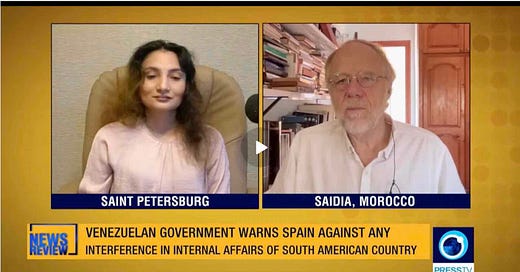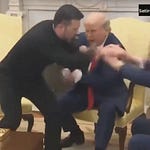Joining us on this edition of the News Review, we have podcaster and journalist Esha Krishnaswamy joining us from St. Petersburg. We also have editor of Veterans Today, Kevin Barrett, who's joining us from Saidiya, Morocco. Welcome to the program, to the both of you. Let's start off with Ms. Krishnaswamy. Esha, please break down this political row that exists right now between Spain and Venezuela. Help us better understand the components of this.
Esha Krishnaswamy: Well, this is not the first time that Spain has granted asylum to members of the Venezuelan opposition. They also granted asylum to Leopoldo Lopez, who was also part of the Venezuelan opposition. And what most people don't realize is that the Venezuelan opposition engages in both paramilitary activities and extreme violent activities. In 2017, after the elections, they engaged in a breathtaking amount of violence. And even this year, after the elections, they engaged in a breathtaking amount of violence.
And what is also interesting is that they're supported by the US, the State Department, the (CIA front) National Endowment for Democracy. And in this year, they engaged in kind of many color revolution type tricks. I interviewed a journalist, Brian Mayer, and he was telling me the story where after the polls closed, the opposition got together many people in the station and had cameras and said, open the poll, let us vote, let us vote. But it was after the polls had closed. And they've burned down pharmacies, they've burned down many infrastructure.
So it's not a peaceful opposition. And basically, they know that if they allow the votes to be fully counted, they're going to lose. So their idea is to cry fraud early. And what Spain is doing is trying to delegitimize the election, even though almost every international observer has said that it was conducted freely and fairly. And so that is kind of why they've recognized González as the winner, even though the results show the opposite.
Kevin Barrett, please share with us your perspective on this diplomatic row between Spain and Venezuela, and where does this stance from Madrid come from?
Well, Madrid is, of course, part of NATO, which is U.S.-occupied Europe. So more often than not, the capitals of the European vassal states will go along with whatever they're told to do by their American masters. And in this case, the Anglo-Zionist empire that's in some ways headquartered in Washington, D.C., wants to overthrow this Bolivarian government in Venezuela and has been working at this now for decades because Venezuela sits on enormous oil resources.
Prior to the Bolivarian revolution, the American big oil interests and of course the strategic interests that depend on control of resources to control the world really needed to try to reverse that. And so they've been working to try to overthrow the Venezuelan government now consistently for decades. And unfortunately, Spain—which every now and then is capable of taking a slightly independent position by being a little more open to legally going after the Zionists for genocide than the Americans are, things like that—but they're not willing to completely buck their masters and support the Bolivarian Revolution, far from it.
So that's what's really behind this. It's really just like with the so-called war between Ukraine and Russia, which is actually a war between the U.S. and Russia. And likewise,
what we see here is not really a problem between Spain and Venezuela per se, even though they think of it that way because Spain has a history of colonizing Latin America.
But in fact, it's a conflict between the American empire and this recalcitrant country of Venezuela that thinks that it has the right to control its own oil resources.
Staying with you, Mr. Barrett, when it comes to countries like Venezuela, who benefits from this type of political turbulence and political instability in these countries?
Well, clearly the US cannot allow the Bolivarian governments of Venezuela to succeed, and they will do anything that they can to try to undermine them. And what we're seeing now is basically just another color revolution attempt to overthrow the government of Venezuela. And we've seen a number of these previous coup attempts. We also saw the likely murder of Hugo Chavez, whose death most likely was not natural, one of a long series of events, of U.S. imperial efforts to regain control of Venezuela and its oil resources. So it's a long-term struggle. But the arrogance of these people who think that they're the only ones in the world who can decide which governments are legitimate, which are not, what election outcomes are.
We had huge protests in the United States in 2020 over an allegedly rigged election. And that's far from the first likely rigged American election. But we don't see Venezuela jumping in and declaring that Trump is the rightful president after Biden is in the White House. It's the U.S. that runs all around the world interfering, saying who is which government and then overthrowing governments, installing US puppets.
And that's one of the downsides of the current world order, which is dominated by the American empire and the wealthy interests behind it, the oligarchs—disproportionately Zionist oligarchs, unfortunately—which is the reason that we have a genocide going on in Palestine that's being committed with complete impunity.
Ms. Krishnaswamy, do you agree with Mr. Barrett that the United States doesn't want Bolivarian governments like Venezuela to succeed?
It's obvious. Because before the Bolivarian Revolution in U.S. oil companies controlled a lot of the Venezuelan resources and Venezuelan people were completely impoverished. And after Hugo Chavez ended up nationalizing many of these oil resources and also leading a more independent path, they've created many social programs, for example, for education, for housing, et cetera. and it's been it's clear that the US does not want such a project to succeed.
One of the most interesting things was in there was a State Department memo that talked about the Cuban threat. And the Cuban threat was basically that once people see Cuba, other countries in Latin America will think that they're entitled to things like food and education. And that's why they said they call Cuba a “threat of a good example.”
And it's the same thing with Venezuela and Bolivia in that they don't have to be indebted to Washington. They can have their own path. And that's why they are have been severely sanctioning Venezuela They've even literally stolen Venezuelan oil. They've taken Venezuelan resources and given it to Juan Guaido. And it's because they don't want Venezuela to be a threat of a good example of what can happen when a country has a truly democratic system.
All right. Thanks a lot. Podcaster and journalist Esha Krishnaswamy joining us from St. Petersburg and editor of Veterans Today, Mr. Kevin Barrett, joining us from Saidi, Morocco. With that, it brings us to an end here on this edition of the News Review.













Share this post